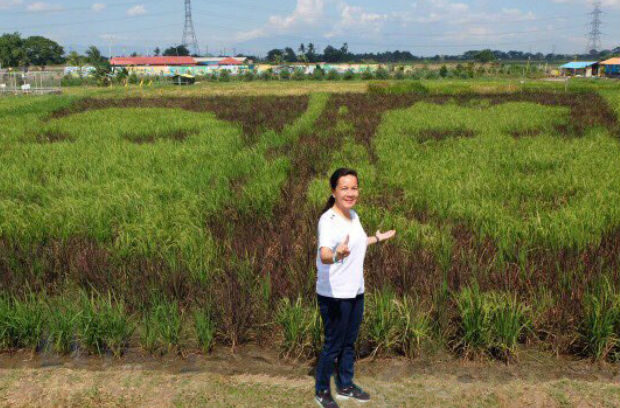
Senator Grace Poe visited the Philippine Rice Research Institute (PhilRice) to see palay art featuring the likeness of her late father Fernando Poe Jr. on Tuesday (April 25). Poe championed a more comprehensive research program for food production. CONTRIBUTED PHOTO/OFFICE OF SEN. GRACE POE
SCIENCE CITY OF MUNOZ – Senator Grace Poe pressed for more support for rice research and technology, when she visited the rice paddy art that features the likeness of her father, the late actor Fernando Poe, Jr. in Barangay (village) Maligaya here on Tuesday (April 25).
Poe said she just witnessed the effect of drought in Pangasinan when she joined the annual Mango-Bamboo Festival that opened in San Carlos City.
The government, she said, needs to raise the productivity of the country’s best rice lands to match the production of rice exporting countries.
“I trust that this [palay art] would inspire the youth about agriculture. It displays our creativity at drawing attention to the agricultural sector,” she said, after meeting officials and researchers of the Philippine Rice Research Institute (PhilRice). Philrice undertook the rice art project.
Earlier on the same day in San Carlos City, Poe urged government researcher and scientists to formulate organic and safe pesticides to combat the pests that have been ailing the mango industry, in the face of global warming.
Mayor Joseres Resuello said mango – for which the city is known – has been infested with cecid flies. The cecid larvae burrows into the fruits and damages the flesh and the rind.
“Because of global warming, the weather conditions change. In January it was already hot so the mango trees thought it was already summer and bear fruits. Then it suddenly gets colder, and then it rains. So the life cycle of these pests may also have gone haywire,” she said in Filipino.
City Agriculture Officer Estrellita Jacaban said mango production this year was down by 30 percent as compared to last year, and prices of the fruits soared to P1,800 per kaing (20 kilos) or P90 a kilo. Last year, it sold for P1,200-P1,500 per kaing. Pangasinan is the country’s top mango producer, with this city contributing the highest volume of production.
Jacaban said 743 hectares in the city are devoted to mango orchard. Each hectare is planted to 44 trees.